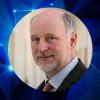
It is our pleasure to announce that Senior Population and Just Societies Program Advisor, Wolfgang Lutz, will take up the reins as interim IIASA Deputy Director for Science from 1 August 2022.
Lutz brings a wealth of experience to the Deputy Director General for Science position, in which he will provide interdisciplinary scientific leadership to the institute and ensure that IIASA continues to deliver the science-based evidence and tools decision makers need to develop informed and resilient policies.
“Wolfgang Lutz is a world class scientist who has been affiliated with IIASA during most of his career. IIASA is very fortunate to be able to call on his leadership and experience at this critical juncture in its history,” says Michael Clegg, Chair of the IIASA Governing Council.
“He has made significant contributions to the field of systems analysis throughout his career and has extensive knowledge of IIASA and what it stands for. I look forward to working with him to ensure that we maintain and enhance the institute’s quality research environment to produce cutting-edge solutions that are impactful and policy-relevant,” adds IIASA Director General, Albert van Jaarsveld.
In addition to the various roles he has filled at IIASA over the years, Lutz is the Founding Director of the Wittgenstein Centre for Demography and Global Human Capital, a cooperation between the University of Vienna (where he is also a professor in the Department of Demography), IIASA, and the Austrian Academy of Sciences (where he is a Director of the Vienna Institute of Demography). He holds a PhD in Demography from the University of Pennsylvania, USA, and has published widely on international population trends with a special focus on population forecasting, population-development-environment interactions, and introducing education as a standard demographic dimension in addition to age and sex.
He has won numerous prestigious awards including the Wittgenstein Prize, two European Research Council (ERC) Advanced Grants, the Mattei Dogan Award of the International Union for the Scientific Study of Population (IUSSP), and the Mindel C. Sheps Award of the Population Association of America (PAA). He is a member of the Austrian Academy of Sciences, the German National Academy Leopoldina, the US National Academy of Sciences (NAS), the World Academy of Sciences (TWAS), the Finnish Society for Sciences and Letters, and the Academia Europaea. He was also appointed by the UN Secretary-General to be one of the 15 members of the Independent Group of Scientists to produce the quadrennial Global Sustainable Development Report 2019.
"For 50 years IIASA has been a unique place for the truly comprehensive scientific study of the multiple challenges to human wellbeing. It has also been a unique bridge between the scientific communities in different parts of the world. I personally benefited from these two unique strengths of IIASA throughout my career and will do everything I can to maintain and further strengthen them," Lutz concludes.
News

23 July 2024
Introducing the IIASA Justice Framework

10 July 2024
Latest European Demographic Data Sheet highlights lasting impact of war and migration

13 June 2024